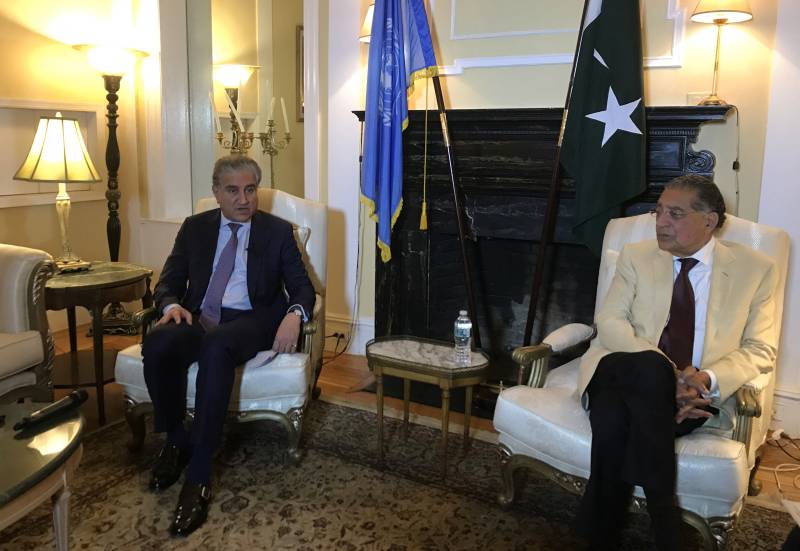Pakistan calls for unfreezing of Afghan assets ahead of UN talks
Qureshi warns an economic collapse could trigger humanitarian catastrophe

Stay tuned with 24 News HD Android App

Pakistan has called on world powers to unblock billions of dollars in Afghan assets frozen after the Taliban takeover but said it did not expect recognition soon of the new government.
Ahead of talks on Afghanistan at the UN General Assembly, Pakistani Foreign Minister Shah Mahmood Qureshi said the most urgent priority was averting an even deeper economic collapse of the neighbouring nation that could trigger a humanitarian catastrophe.
"On one hand, you're raising fresh funds to avert a crisis and on the other hand money that is theirs -- belongs to them -- they cannot use," Qureshi told reporters in New York on Monday.
"I think freezing the assets is not helping the situation. I would strongly urge the powers that be that they should revisit that policy and think of an unfreeze," he said.
"It will be a confidence-building measure as well and that could also incentivize positive behavior."
The United States froze $9.5 billion in Afghan central bank assets and international lenders have stayed clear of Afghanistan, wary of providing money that could be used by the Taliban.
Pakistan was the chief backer of the Taliban's draconian 1996-2001 regime and has long faced US allegations that its intelligence service fueled the Islamist insurgents in their two-decade battle against NATO forces and the now collapsed Western-backed government.
While calling for engagement with the Taliban, Qureshi appeared to share the US stance that it was premature to establish formal ties.
"I don't think anybody is in a rush to recognize at this stage and the Taliban should keep an eye on that," Qureshi said.
If the Taliban want recognition, "they have to be more sensitive and more receptive to international opinion," he said.
Qureshi voiced hope that the Taliban would be more inclusive after forming a caretaker government that includes figures blacklisted by the United Nations on terrorism allegations.
But he said he saw "positives" from the Taliban including a declaration of amnesty and a willingness to include ethnic groups other than the group's dominant Pashtuns.
"These are trends that must be encouraged," he said.
Activists and witnesses say on-the-ground reality is different than the Taliban's promises, with women and girls already being excluded from employment and education even without formal announcements by the insurgents.
Face-to-face apology
Relatives of the victims of a US drone strike that wiped out 10 members of an Afghan family in a "tragic mistake" demanded a face-to-face apology and compensation on Saturday.
Ezmarai Ahmadi was wrongly identified as an Islamic State militant by US intelligence, which tracked his white Toyota for eight hours on August 29 before targeting the car with a missile, killing seven children and three adults.
A top general admitted the attack was an error, and US Defense Secretary Lloyd Austin apologised to the relatives of those killed.
However, Ahmadi's 22-year-old nephew, Farshad Haidari, said that was not enough.
"They must come here and apologise to us face-to-face," he told AFP in a bombed-out, modest house in Kwaja Burga, a densely populated neighbourhood in the northwest of the Afghan capital.
Haidari, whose brother Naser and young cousins also died, said the US had made no direct contact with the family.
"They must come and compensate," he said. "They were not terrorists, and now it is clear for them and all the world to see," he said of his relatives.
Haidari added that he wanted officials to "capture and prosecute" those responsible for firing the missile.
"Most of them had worked with Americans," Haidari said. "Naser had worked with Americans for about 10 years. My uncle had also worked with international organisations."
At the time of his death Ahmadi was working for a US aid group.
Haidari said all the victims had received evacuation papers and had hoped to go to the United States soon, like many Afghans eager to flee newly Taliban-ruled Afghanistan.
- 'Intelligence was wrong' -
On the night of the strike, Ahmadi pulled his car into his driveway before youngsters piled into the vehicle -- pretending the parking routine was an adventure -- while he watched from the side.
A missile then came screeching down onto the car -- obliterating the lives of 10 people in an instant.
The wreckage of the vehicle was still in the courtyard of the house on Saturday, alongside another burned-out vehicle.
Broken glass was strewn across the ground and the tiny sandals of the young victims had been placed on the mangled chassis.
US Central Command commander General Kenneth McKenzie said American intelligence had seen the vehicle at a site in Kabul that had been identified as a location from which IS operatives were believed to be preparing attacks on the Kabul airport.
Three days earlier an Islamic State-Khorasan suicide bomber had killed scores at the airport, including 13 US service members.
"We selected this car based on its movement at a known target area of interest to us," McKenzie said.
"Clearly our intelligence was wrong on this particular white Toyota," he said.
- 'America must compensate' -
Defence secretary Austin said Ahmadi's activities that day were "completely harmless", and that the man was "just as innocent a victim as were the others tragically killed".
"We now know that there was no connection between Mr. Ahmadi and ISIS-Khorasan," said Austin.
Ahmadi's brother Aimal, whose three-year-old daughter Maleka died in the attack, said "America must compensate".
"Today it was good news for us that the United States officially admitted that they had attacked innocents civilians," he said. "Our innocence has been proven.
"We demand justice from international institutions... Then we want compensation."
McKenzie said the US government was studying how payments for damages could be made to the families of those killed.
